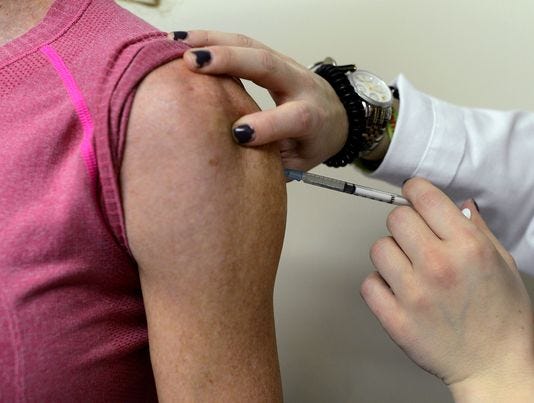Image may be NSFW.
Clik here to view.
Hospitalizations and deaths have been some of the highest ever recorded for the elderly.
This season's flu vaccine was almost completely ineffective in people 65 and older, which could explain why rates of hospitalization and death have been some of the highest ever recorded for that age group, according to early estimates released Thursday by the Centers for Disease Control and Prevention.
For people under 65, getting vaccinated this season reduced the need to go to the doctor for the flu by one-half to two-thirds.
For those 65 and older, though, it helped in just 9% of cases, a number too low to be statistically significant, according to a report in the CDC'sWeekly Morbidity and Mortality Report released Thursday. The study was based on a survey of 2,697 children and adults by the U.S. Influenza Vaccine Effectiveness Network from Dec. 3, 2012, through Jan. 19, 2013.
While this year's flu season has been moderately severe for the general population, "in people over 65 we're seeing a pretty severe year," said Joe Bresee, chief of the epidemiology and prevention branch in the CDC's influenza division.
Researchers don't know why the vaccine was unhelpful for older people.
"We know that any vaccine, including flu vaccines, is less effective as you get older," Bresee said. "We often see lower effectiveness in people over 65, though not always."
This season's flu hospitalization and death rates in those 65-plus have been "higher than we've ever seen with this group," said Michael Jhung, a CDC epidemiologist. In the last week of January, the rate of people in that age group who died from a laboratory-confirmed case of influenza was 116 per 100,000. Previously, the highest rate was 90 per 100,000, he said.
The CDC findings are consistent with studies of how well this season's flu virus worked in Europe. The CDC researchers cautioned that the findings were interim and looked only at people who had gone to the doctor with flu symptoms. More research is needed to see if chronic medical conditions and other problems associated with aging might have affected the outcome, they said. The CDC plans to do further research.
Overall, the vaccine's effectiveness for everyone older than 6 months was 56%, just slightly lower than the 62% that had been estimated earlier in the season. This season's vaccine contains protection against three flu strains: H3N2, influenza B and H1N1. The vaccine was 67% effective against influenza B in adults over 65 but only 9% effective against H3N2, the CDC found. There were not enough H1N1 to tell its effectiveness.
When broken into age groups, the vaccine's overall effectiveness was:
- 6 months to 17 years, 58%.
- 18 to 49 years, 46%.
- 50 to 64 years, 50%.
- 65 and older, 9%.
As people age, the immune system becomes less able to battle sickness. Some studies in past flu seasons have found the vaccine to be a strong benefit for older adults, some less. A study that looked at several years worth of data found the vaccine reduced the risk of influenza-associated hospitalizations among older adults by 61%.
This doesn't mean people 65 and older shouldn't get vaccinated, Bresee said. "What we know about people over 65 is that they're at extremely high risk of getting hospitalized or even dying of flu," he said, and even moderate protection is helpful.
Bresee said people who live and work around people 65 and older need to get vaccinated to make it less likely that they pass the illness along.
